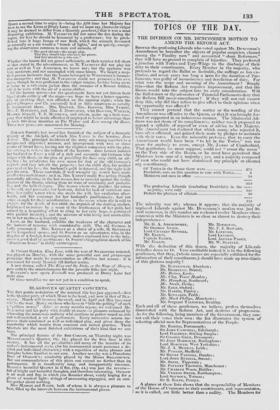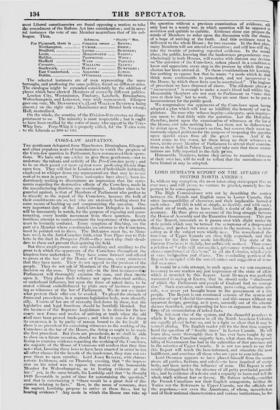TOPICS OF THE DAY.
THE DIVISION ON MR. DUNCOMBE'S MOTION TO AMEND THE REFORM ACT.
SHOULD the professing Liberals who voted against Mr. DrNeosint's Amendment be hereafter the objects of popular suspicion, classed among the " Finality men" and accounted " sham Reformers," they will have no ground to complain of' injustice. They preferred a junction with Tories and Tory-Whigs to the discharge of their duty to their constituents. Every Member in the majority, who pretends to regard the Ballot as desirable, the suffrage as too ex- clusive, and seven years too long a term for the duration of' Par- liaments, was guilty of inconsistency and dereliction of' duty. For what was the scope and meaning of the Amendment ? Simply this—that the Reform Act requires improvement, and that the House would take the subject into its early consideration. Will the Ballot-men or the advocates of Triennial Parliaments deny that the Reform Bill needs amendment ? If they will not and cannot deny this, why did they refuse to give effect to their opinions when the opportunity was offered?
They cannot pretend that the matter or the wording of the Amendment was offensive to the Queen, or that it was brought for- ward or supported in an indecorous manner. The Ministerial Ad- dress was not shorn of its compliments; neither was it proposed to append a syllable of reproof or even of advice to her Majesty. The Amendment hut declared that which many, who rejected it, have often affirmed, and gained their seats by pledges to maintain with their votes. Even the miserable pretence, that to carry the s1mendment would have been " to let in the Tories," was too gross for anybody to avow, -except Mr. Jeems of Cumbedand. That gentleman, we must suppose, could not " count the noses " on the Tory side of' the House, or he must have perceived that Ministers were sure of a majority ; yes, and a majority composed of men who would not have abandoned any principle or cheated any constituency.
Of Tories in the House there were 271 Donlan's, sure on this question to vote with Tories 9
Ministers timid men in office 30
310
The professing Liberals (excluding Doubtfuls) in the — mejority, were only 146 Deduct the phalanx of officials 30 116
The minority was 86 ; whence it appears, that the majority of unplaced Liberals against Mr. DUNCOMDE'S motion was just 30. And moreover, in this number are reckoned twelve Members whose connexion with the Ministers is so close as almost to destroy their independence— Mr. G. A. ABERCROMRY, Mr. Honnorsr, Sir GEonun ANSON, Mr. F. J. HOWARD,
Lord CHARLES RUSSELL, Mr. LEFEYRE, Mr. ELmen, Lord LEVESON, Captain EnmeE, Lord Anrnen PAGET, Mr. ELLIOT, Mr. W. STANLEY.
With the deduction of this dozen, the majority of Liberals dwindlee down to 18. Very creditable indeed it is to the following
gentlemen, that they, (whose names are especially exhibitedlbr the
intbrmation of their constituents,) should have made up two-thirds of this glorious majority !
Mr. BANNEamAx, Aberdeen ;
Mr. BERKELEY, Bristol;
Mr. Baines, Leeds; Mr. Clay, Tower Hamlets ; Mr. Humphery, Southwark ; Mr. Stnat, Derby; Mr. nue, Oxford ; Mr. HASTIE, Paisley; Mr. KINNAIRD, Perth ; Mark Phillips, Manchester ; Mr. Sergeent TALFOURD, Reading.
Each and all of these gentlemen, we believe, profess themselves
dissatisfied with the Reform Act, and desirous of progression. As for the following, being members of the Government, they can-
not call their votes their own : the list illustrates the sy-stent of
selecting official men for Representatives of' the People.
Mr. BARING, Portsmouth ; Sir Jolts CAMPBELL, Edinburgh; Lord DALMENY, Stirling Burghs; Sir Gnome GREY, Devonport ; Sir Joux Honnorse, Nottingham ; Lord Mourenr, West Yorkshire; Mr. J. A. Munnev, Leith ;
Mr. PARKER, Sheffield;
Sir 11Exny PAnsELL, Dundee ; Lord Jolts Rt7ssemt., Stroud ; Mr. Snell., Tipperary ; Mr. Poreerr 'lummox, Manchester ; Mr. CHARLES WOOD, Halifax ; Mr. VERNON SMITH, Northampton ; Lord SKvsmen, Totness ; Sir R. Rom, Penryn.
A glance at these lists shows that the responsibility of Members
of the House of Commons to their constituents, and representation, as it is called, are little better than a nullity. The Members for
most Liberal constituencies are found ,opposing a motion to take the amendment of the Reform Act into consideration; and in seve- ral instances the vote of one Member neutralizes that of his col- league. Thus,
The selected instances are of men representing the same boroughs, and professing the same politics, found on different sides. The catalogue might be extended considerably by the addition of places which have elected Members of avowedly different politics. London City, Westminster, Finsbury, Lambeth, Birmingham, Wolverhampton, and Leicester, were truly represented. Glasgow gave one vote, MT. DEN NISTOUN'S, (Lord WILLIAM 13ENTINCK being absent,) on the right side ; Manchester and Bristol both wrong; Hull, neutralized.
On the whole, the scrutiny of the Division-lists creates no disap- pointment to us. The minority is most respectable ; but it ought to have been swelled by the votes of many who appear in the Tory- Whig lists. Tory-Whig it is properly called, fur the Tories were to the Liberals as 280 to 140. COLLIER versus ... BEwEs;
CURRIE SMITH ; LISTER. BUSFIELD ; MOLESWoRTH BAINES ; PROTIII:n0E WOOD ; WARD PARKEn ; WILLIAMS ELLICE; HARVEY HrstallERY; AGLIONIIT JAMES;
O'CONNELL Huvrox.
For Plymouth, there is Northampton, Bradford, Leeds, Halifax, Sheffield Coventry, Southwark, East Cumberland, Dublin,
Rammer& " Finality " Men.



























 Previous page
Previous page